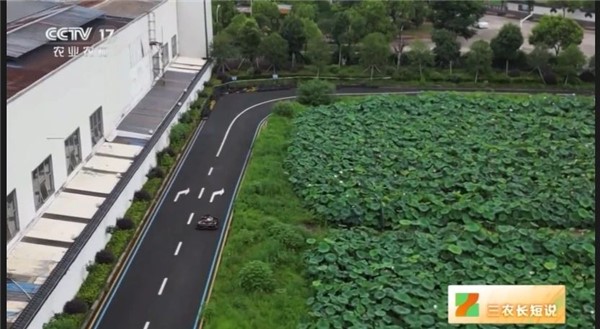 On 2 May 2024, CCTV-17 broadcast a special programme titled "Mutual Efforts Make Youth and Rural Areas Better Together" on 'San Nong Chang Duan Shuo,' which focuses on agriculture, farmers, and rural issues.
On 2 May 2024, CCTV-17 broadcast a special programme titled "Mutual Efforts Make Youth and Rural Areas Better Together" on 'San Nong Chang Duan Shuo,' which focuses on agriculture, farmers, and rural issues.
The programme featured the story of exemplary student representatives from the Open University of China (OUC)'s "One College Student Per Village" programme. It highlighted the achievements of Lou Ganqiang, secretary of the General Party Branch of Lianfeng Village, Huzhen Township, Jinyun County, and Li Chunmeng, chairperson of the Wild Rice Stem Industry Farmers’ Cooperative Union in Lishui City, Zhejiang Province.
From an individual to a group, a beautiful and prosperous "rural experiment"
In Jinyun County, Lishui, Zhejiang, situated in the southern mountainous region of the province, a dedicated group has tirelessly pursued rural experiments. These efforts have transformed two villages, located just over two kilometers apart, into the picturesque and prosperous Garden Village and Wild Rice Stem Village respectively.
The karting circuit in Lianfeng Village, Jinyun County, spans 800 metres and accommodates 16 go-karts. It's hard to believe that just four years ago, this now spacious and smooth circuit was a stretch of muddy pits. During peak seasons, one might wait in line for two to three hours just for a chance to race.

Lou Ganqiang said, "This is also a great project for boosting collective income in Lianfeng Village. We launched the operation on 8 August 2020, and by the end of that year, the project alone had increased the village's collective income by 1.1 million yuan."
In 2019, Lianfeng Village began transforming from being burdened with over 1 million yuan in debt to achieving an income increase exceeding 1 million yuan. In March 2017, Lou Ganqiang was elected as the secretary of the General Party Branch of Lianfeng Village.
As the youngest secretary in the history of Lianfeng Village, he understands that to transform a village burdened by debt and squalor, one must "head towards the tiger's den" despite the dangers.
Lou Ganqiang said, "At that time, our village's collective income barely reached 90,000 yuan, so we had to take out loans because we didn't have enough money. We called it 'operating in debt.' We demolished illegal constructions, expanded roads, and renovated the external facades of the buildings in the village. We initiated 46 projects simultaneously and, within 126 days, we created the prototype of the new Lianfeng Village."
Lou Ganqiang stated, "Our village is completely flat, with no mountains or rivers, which suggests a lack of sustainability. Therefore, to forge a path for collective economic development, we had to rely on education." It was in that same year that Lou Ganqiang applied to participate in the Ministry of Education's "One College Student Per Village" Programme, organised and implemented by the OUC and its affiliates. In the pioneers’ class of Lishui Open University (OU), he gained new insights from field visits and practical teaching. Lou Ganqiang recalled, "When we visited Hou'an Village in Tiantai County, we came across a track with go-karts. It suddenly struck me that it was feasible to build a karting circuit with a lotus pond in the centre and the track around it. That image popped into my mind instantly."

Last year, Lianfeng Village generated a collective income of over 1.2 million yuan, welcoming approximately 40,000 visitors.
In Nongxing Village, located just over two kilometres from Lianfeng Village, Li Chunmeng became one of the first locals to successfully cultivate wild rice stems. Her pioneering efforts made her a leading figure in the wild rice stem industry among local villagers. In 2009, at the age of 36, she launched a thriving business. Eager to expand her operation and establish a brand, she enrolled in the "One College Student Per Village" Programme, studying Agricultural Economic Management at Jinyun Radio and TV University.
Li Chunmeng said, "After taking classes at the Radio and TV University (now Jinyun College of Zhejiang Open University), I realised the importance of applying for a trademark. Subsequently, I had the trademark registered, which helped set everything on the right track."
From then on, Li Chunmeng developed more innovative ideas. In 2010, she observed that several harvested wild rice stems were sprouting new shoots during processing. This observation inspired Li Chunmeng to organise a research and development team dedicated to studying wild rice stem regeneration technology.
In 2013, the dual-harvest technique for wild rice stems was successfully developed. Previously, wild rice stems matured only in June and July, but this new technique enabled an additional harvest in September and October. As a result, the yield per mu (one mu is approximately 0.067 hectares) increased by over 50%. In 2014, Li Chunmeng also applied for a patent.

This year, she established two experimental paddy fields behind the cooperative to conduct water-saving cultivation trials with wild rice stems. Today, Li Chunmeng has handed over the leadership of the wild rice stem industry to her daughter and the next generation. In her current experiments on water-saving cultivation of wild rice stems, she actively encourages young people to bring forward more ideas and undertake more substantial work. She hopes that her daughter and other young individuals of her generation will be as bold and proactive as she was in her youth.
Reprinted by OUC News Network from CCTV